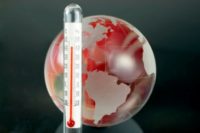 A new report report commissioned by the World Bank shows that carbon dioxide emissions continue to rise at alarming rates, and that adapting to a 4 degrees Celcius increase may not be possible -- or enough.
A new report report commissioned by the World Bank shows that carbon dioxide emissions continue to rise at alarming rates, and that adapting to a 4 degrees Celcius increase may not be possible -- or enough.
The report predicts that carbon dioxide emissions will reach a record high in 2012 – after breaking a previously set record in 2011.
Climate change and its effects were a major topic at the Doha Climate Change Conference last month in Qatar.
"A faster response iniatives to climate change is necessary and possible," said Christiana Figueres, Executive Secretary of the UN Framework Convention on Climate Change (UNFCCC). "Doha must make sure the response is accelerated."
However, experts are pessimistic about the possibility of effective government action, noting that no new emissions targets are in the works and there’s been little progress on a protocol that is supposed to be finished in 2015 and implemented in 2020.
"We won't get an international agreement until enough domestic legislation and action are in place to begin to have an effect," Figueres said. "Governments have to find ways in which action on the ground can be accelerated and taken to a higher level."
US emissions highest, but China and India emissions increasing rapidly
Researchers from the Global Carbon Project (GCP) reported that global carbon dioxide (CO2) emissions rose three percent in 2011 to a record 9.5 billion metric tons and are expected to increase by another 2.6% in 2012. While per capita emissions in the US are more than twice as high as anywhere else, overall emissions in China and India have increased most rapidly as economic growth in those nations is being fueled by coal.
As a result, the goal of limiting global temperature increases to an average of two degrees Celsius seems unlikely, although climate negotiations at the 2009 conference in Copenhagen led to a non-binding agreement among nations to do so. In fact, the GCP report warns that the current trajectory could lead to temperature increases as high as five degrees Celsius by the end of the century.
The report, Turn Down the Heat: Why a 4°C Warmer World Must be Avoided, warns, "Without further commitments and action to reduce greenhouse gas emissions, the world is likely to warm by more than 3°C above the preindustrial climate. Even with the current mitigation commitments and pledges fully implemented, there is roughly a 20 percent likelihood of exceeding 4°C by 2100."
"The science is unequivocal that humans are the cause of global warming," the report asserts.
Heat waves, rising sea levels and water supplies affected
The researchers describe what they say would be the global effects of a 4°C temperature increase:
• Extreme heat waves, that without global warming would be expected to occur once in several hundred years, will be experienced during almost all summer months in many regions. The effects would not be evenly distributed. The largest warming would be expected to occur over land and range from 4° C to 10° C. Increases of 6° C or more in average monthly summer temperatures would be expected in the Mediterranean, North Africa, Middle East and parts of the United States.
• Sea level-rise by 0.5 to 1 meter by 2100 is likely, with higher levels also possible. Some of the most highly vulnerable cities are located in Mozambique, Madagascar, Mexico, Venezuela, India, Bangladesh, Indonesia, the Philippines and Vietnam.
• The most vulnerable regions are in the tropics, sub-tropics and towards the poles, where multiple impacts are likely to come together.
• Agriculture, water resources, human health, biodiversity and ecosystem services are likely to be severely impacted. This could lead to large-scale displacement of populations and consequences for human security and economic and trade systems.
Many small islands may not be able to sustain their populations, the report states.
"There is also no certainty that adaptation to a 4°C world is possible," the report continues. "It is likely that the poor will suffer most and the global community could become more fractured, and unequal than today."
"The heat must be turned down. Only early, cooperative, international actions can make that happen."
Among the initiatives that could help avoid such a scenario are ending fossil fuel subsidies that, according to the World Bank, exceed $1 trillion; introducing natural capital accounting to supplement or even replace Gross Domestic Product (GDP) as a measure of national well-being; enacting a meaningful price on carbon; and increasing public and private investment in green infrastructure.



